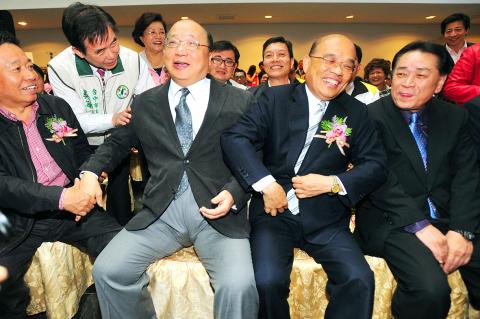The Democratic Progressive Party (DPP) appears to be hoping that a conflict between Chinese Nationalist Party (KMT) candidate Yen Kuan-hen (顏寬恆) and President Ma Ying-jeou (馬英九) could help it win tomorrow’s legislative by-election in Greater Taichung’s second electoral district.
“Ma, who is the KMT’s chairman, has not campaigned for Yen, and Yen has not used the KMT’s logo during his campaign, nor has he emphasized that he represents the KMT,” DPP Chairman Su Tseng-chang (蘇貞昌) said at a campaign stop in Greater Taichung.
Su said he believes the president lacked confidence because of his low approval ratings and that Yen was attempting to distance his candidacy from the KMT.

Photo: Liao Yau-tung, Taipei Times
Yen’s father, Yen Ching-piao (顏清標), was a former Non-Partisan Solidarity Union legislator whose status was revoked after he was found guilty of corruption. The younger Yen is aiming to fill the post left vacant by his father after his conviction.
The DPP has promoted the by-election as a vote of no confidence in Ma’s governance in an apparent effort to neutralize the Yen family’s strong political presence in the electoral district, a traditional KMT stronghold which includes the districts of Shalu (沙鹿), Longjing (龍井), Wurih (烏日), Dadu (大肚), Wufeng (霧峰) and part of Dali (大里).
Chen Shih-kai (陳世楷), the 36-year-old DPP candidate, has reminded the 220,000 voters in the constituency that local politics should not be dominated by one family, the DPP said.
Chen’s campaign managers and DPP headquarters both said they were cautiously optimistic about Chen’s chances of becoming the DPP’s 41st legislator.
However, they said they were concerned about vote-buying and the turnout rate, which is usually lower than 50 percent in local elections.
The DPP has continously urged judicial authorities to crack down on potential vote-buying and encouraged its supporters to vote for Chen.
DPP Secretary-General Lin Hsi-yao (林錫耀) said the DPP is confident it can beat any candidate in the by-election, but that “because the Yen family has such strong political connections” it would be hard to win against Yen Kuan-hen.
Chen’s deputy campaign manager, Li Chin-hsiang (利錦祥), said that a low turnout rate could benefit the KMT, adding that “in local elections, the outcome is usually decided by whether your supporters come out to vote.”
Unlike the KMT, which only sent Legislative Speaker Wang Jin-pyng (王金平) and Taichung Mayor Jason Hu (胡志強) to campaign for Yen Kuan-hen, DPP heavyweights, including former chairperson Tsai Ing-wen (蔡英文) and former premiers Frank Hsieh (謝長廷) and Yu Shyi-kun , have all campaigned for the party’s candidate in the region.
DPP legislative caucus convener Ker Chien-ming (柯建銘) described the by-election as a “critical battle” which could impact the nation’s democratic development and party competition in the coming years, saying that Chen’s victory could have the same impact as DPP Legislator Liu Chien-kuo’s (劉建國) win in Yunlin County in 2009, which propelled the party up from a low point after it lost the presidential election in 2008.
Su and Tsai are scheduled to campaign for Chen in Greater Taichung tonight.

US President Donald Trump yesterday announced sweeping "reciprocal tariffs" on US trading partners, including a 32 percent tax on goods from Taiwan that is set to take effect on Wednesday. At a Rose Garden event, Trump declared a 10 percent baseline tax on imports from all countries, with the White House saying it would take effect on Saturday. Countries with larger trade surpluses with the US would face higher duties beginning on Wednesday, including Taiwan (32 percent), China (34 percent), Japan (24 percent), South Korea (25 percent), Vietnam (46 percent) and Thailand (36 percent). Canada and Mexico, the two largest US trading

ACTION PLAN: Taiwan would expand procurement from the US and encourage more companies to invest in the US to deepen bilateral cooperation, Lai said The government would not impose reciprocal tariffs in retaliation against US levies, President William Lai (賴清德) said yesterday, as he announced five strategies to address the issue, including pledging to increase Taiwanese companies’ investments in the US. Lai has in the past few days met with administrative and national security officials, as well as representatives from various industries, to explore countermeasures after US President Donald Trump on Wednesday last week announced a 32 percent duty on Taiwanese imports. In a video released yesterday evening, Lai said that Taiwan would not retaliate against the US with higher tariffs and Taiwanese companies’ commitments to

‘SPECIAL CHANNEL’: Taipei’s most important tasks are to stabilize industries affected by Trump’s trade tariffs and keep negotiations with Washington open, a source said National Security Council Secretary-General Joseph Wu (吳釗燮) arrived in the US for talks with US President Donald Trump’s administration, a source familiar with the matter said on Friday. Wu was leading a delegation for a meeting known as the “special channel,” the Financial Times reported earlier. It marked Trump’s first use of the channel since returning to the White House on Jan. 20. Citing a source familiar with the matter, the Financial Times reported that Minister of Foreign Affairs Lin Chia-lung (林佳龍) was also a part of the delegation. The visit came days after China concluded war games around Taiwan and amid Trump’s

CHIP EXCEPTION: An official said that an exception for Taiwanese semiconductors would have a limited effect, as most are packaged in third nations before being sold The Executive Yuan yesterday decried US President Donald Trump’s 32 percent tariff on Taiwanese goods announced hours earlier as “unfair,” saying it would lodge a representation with Washington. The Cabinet in a statement described the pledged US tariffs, expected to take effect on Wednesday next week, as “deeply unreasonable” and “highly regrettable.” Cabinet spokeswoman Michelle Lee (李慧芝) said that the government would “lodge a solemn representation” with the US Trade Representative and continue negotiating with Washington to “ensure the interests of our nation and industries.” Trump at a news conference in Washington on Wednesday announced a 10 percent baseline tariff on most goods